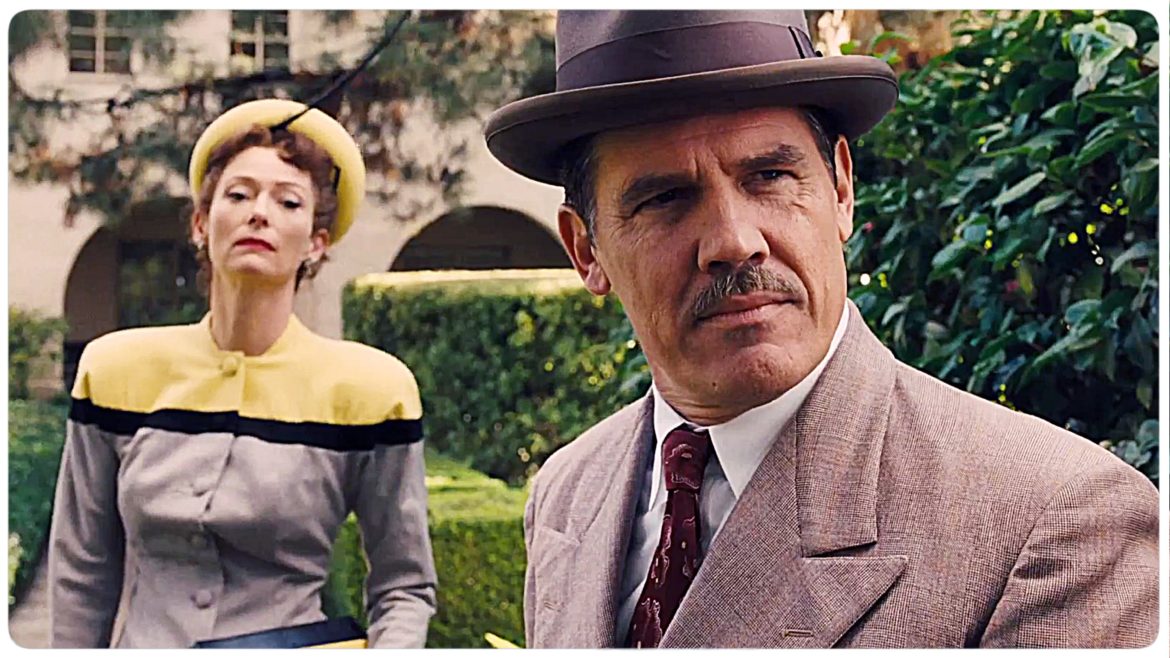Eddie Mannix (Josh Brolin, playing a same-named Hollywood “fixer” loosely based on a real, and notorious, historical figure) is having a rough 48 hours. He’s tasked with keeping the studio’s “assets” in line and out of the tabloids, a tough job when you’ve got a pregnancy to hide, a cowboy actor struggling to transition to romantic leading man, and, last but not least, a marquee star in one Baird Whitlock (George Clooney), who has just been kidnapped by a shadowy organization calling itself “The Future.” He’s also being courted for a job at Lockheed, which promises more regular hours and less stress (H-bomb tests notwithstanding).
Brolin is perfect in the role, a mix of duty-bound tough-guy sincerity and private vulnerability. The latter is showcased in his daily visits to confession, which even the priest is starting to feel is a bit too often. The narrative is routinely interspersed with clips from the various films-within-a-film he’s tasked with managing, as though no one can focus on any one thing for too long. Mannix has no choice, however: holding narratives together is his job, so that the studio can bring its visions to an awed public who just want to see their favorite stars do their thing. Politics intrudes, in the silliest ways possible, and so does religion – Hail, Caesar! (the movie in the movie, not this movie, specifically) is subtitled “A Tale Of The Christ”, so how could it not? Mannix might not be a Christ-figure, but he’s certainly suffering, stoically, for someone‘s sins.
As ramshackle in its shaggy-dog playfulness as The Big Lebowski, as full of absurdist gags as Burn After Reading, and as epic in its knowing ridiculousness as O Brother! Where Art Thou, Hail, Caesar! is a love letter to classic Hollywood written in its own cinematic tropes, but, like any Coens joint, there’s a fair amount of bitterness accompanying all the genial goofballery. There’s also a wealth of allusion and plenty to chew on after it’s done, from questions of faith and duty to critiques of any and all totalizing systems. The brothers’ trick, here as always, is to take their own jokes seriously, and to never miss an opportunity to joke about their seriousness (and everyone else’s). It’s a hard thing to pull off – and a hard thing to analyze without spoilers, for that matter – but they make it look easy.
None of which should surprise their fans. In A Serious Man, their best film to date, the story of Job became an Old Testament comedy about existential dread and the apocalypse. David Ehrlich has posited that Hail, Caesar! is ASM‘s New Testament counterpart, and this idea has much to recommend it. (Tune in tomorrow for a more in-depth look at that.)
But it could just as easily be the manic, madcap flip-side to their Barton Fink: both tell stories of men adrift in Hollywood, facing pressure from all sides as they vainly struggle with art and artists and what it means to be authentic. If Barton Fink is the horrifying Tinseltown nightmare, Hail, Caesar! might be its more fanciful daydream recollection, played out on backlots where unserious men (and women) take extremely seriously the frivolous business of playing dress-up for legions of adoring movie-goers.
Sitting in the dark, staring up at the screen, we all want to believe, and Hollywood is here to make sure the cracks don’t show in our fantasies. The Coens, of course, are off to the side, giggling that anyone could swallow this tripe, but also reveling in it with us. It’s no coincidence that a climactic shot features a central character staring up at the unseen Divine, on a soundstage, a small figure dwarfed by an image revealing his own powerlessness, as much an audience as we ever were. What is faith if not the suspension of disbelief in the impossible, a willingness to allow for artifice in the name of a greater truth? The Coens certainly don’t believe Jesus turned water into wine – indeed, a hilarious round table sequence in which people try and fail to explain the Trinity implodes any notion of reverence – but, contrary to their dour reputation as smug know-it-alls, they seem fairly warm-hearted at the prospect that others might. Whatever works.
The Coens self-references are reaching Pynchonian levels at this point, or at the very least something like a low-key Marvel Cinematic Universe. To name only a few examples: Nicolas Cage’s H.I. in Raising Arizona worked for Hudsucker Industries, which shares its name with Tim Robbins’ employer in The Hudsucker Proxy. The studio in question in Hail, Caesar! may be a stand-in for MGM, but it also shares its name, Capitol Pictures, with the folks who hired Barton Fink to write wrestling movies he felt were beneath him – and what’s more, there’s even a “Wallace Beery Conference Room” in Hail, Caesar!, referencing the star Barton was brought on board to write a picture for. Baird Whitlock may even be a reference to a man of the same name who was Dean of Bard College at Simon’s Rock when the Coens attended – and who was also a noted Christian author, including penning a text that told the story of the Christ through conflation of the Gospels of Matthew, Mark, Luke, and John, a fact no Coen-phile could possibly dismiss as accidental, at least not out-of-hand.
Are these connections full of transcendent meaning, or cosmic goof-offs / piss-takings from pranksters in love with story, image, and the endless permutations of meaning? Or something of both? Well, that’s the question, isn’t it? If it weren’t so funny, it might be infuriating.
And, of course, the film itself is a composite of other filmic references. Hail, Caesar!‘s individual set-pieces evoke the water choreography of Esther Williams movies, the delight of a Gene Kelly dance, the over-the-top self-importance of a Charlton Heston swords-and-sandals epic like Ben-Hur, the countrified charm of a Gene Autry cowboy movie, and so forth, each lovingly recomposed (right down to aspect ratios, like the nerds these guys are) by master cinematographer Roger Deakins, doing some of his best work in a towering career. Hail, Caesar! isn’t just a movie – it wants to be all the movies at once, in front of and behind the camera.
What does it all mean? Is that even the question to ask? How do you ask it, when you can’t catch your breath from laughing at the absurdity?
The Coens have never seemed like they think an answer is forthcoming – which is maybe the truest thing about their approach. We can search and question, but in the meantime, we also have to live in all this artifice and madness, making up our ethics as we go along, answerable to everyone and no one, utterly without reassurance in our conclusions. Which is one key to their work: only fools believe without hesitation, and doing so usually results in catastrophe. There are no real antagonists in Hail, Caesar!, only people who think they have it all figured out. The Coen’s stock response to that crowd: Well, we’ll see about that.
As theology goes, that probably leaves a bit to be desired. But no one ever said the movies were supposed to pull back the curtain on the divine, unless it was just to reveal some guy huffing and puffing, pretending to enlightenment. Holy visions are always one-step removed from slapstick.
Just because you have questions, the filmmakers say here and elsewhere, doesn’t mean you’re entitled to answers. Would that it were so simple.






